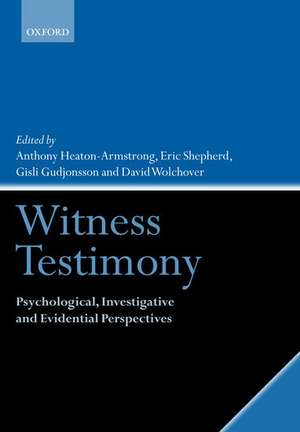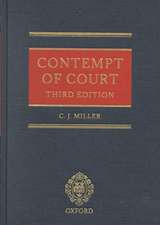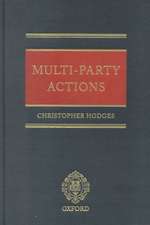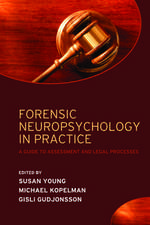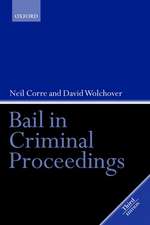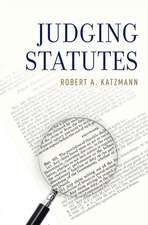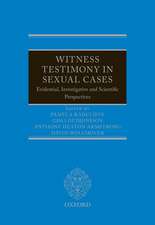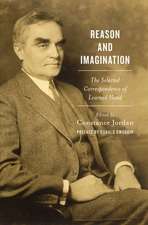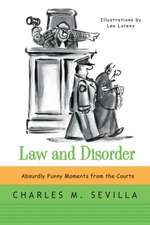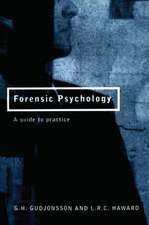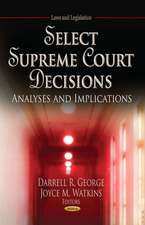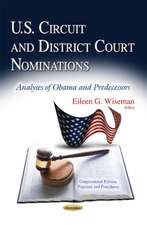Witness Testimony: Psychological, Investigative and Evidential Perspectives
Editat de Anthony Heaton-Armstrong, Eric Shepherd, Gisli Gudjonsson, David Wolchoveren Limba Engleză Paperback – 26 oct 2006
Preț: 720.07 lei
Preț vechi: 1087.45 lei
-34% Nou
Puncte Express: 1080
Preț estimativ în valută:
137.83€ • 149.76$ • 115.85£
137.83€ • 149.76$ • 115.85£
Carte tipărită la comandă
Livrare economică 10-16 aprilie
Preluare comenzi: 021 569.72.76
Specificații
ISBN-13: 9780199278091
ISBN-10: 0199278091
Pagini: 498
Dimensiuni: 171 x 245 x 27 mm
Greutate: 0.79 kg
Editura: OUP OXFORD
Colecția OUP Oxford
Locul publicării:Oxford, United Kingdom
ISBN-10: 0199278091
Pagini: 498
Dimensiuni: 171 x 245 x 27 mm
Greutate: 0.79 kg
Editura: OUP OXFORD
Colecția OUP Oxford
Locul publicării:Oxford, United Kingdom
Recenzii
'I can think of no other book like it in terms of accessibility, breadth, relevance and perhpas most importantly ethos - to achieve truth.' ( John Cooper, Barrister, New Law Journal, 2008)
'This is a book great value and interest to anyone engaged in the practice or study of the law.' ( Justice of the Peace, October 2007)
'This highly original and relevant work signposts the way forward in the examination of witnesses. The area of how we should treat live evidence is a prominent and growing area of concern, and the publication of the book is both timely and essential. The empasis of the work is upon the victim. Indeed, the textbook is dedicated to "victims, whether of crime or miscarriage of justice". ( Criminal Bar Quarterly, April 2007)
This Book is a worthwhile investment for investigation managers, those responsible for developing and delivering witness interview training and for investigators committed to professionalism'( Dr Harfield of the John Grieve Centre, 12 January 2007)
'This is a book great value and interest to anyone engaged in the practice or study of the law.' ( Justice of the Peace, October 2007)
'This highly original and relevant work signposts the way forward in the examination of witnesses. The area of how we should treat live evidence is a prominent and growing area of concern, and the publication of the book is both timely and essential. The empasis of the work is upon the victim. Indeed, the textbook is dedicated to "victims, whether of crime or miscarriage of justice". ( Criminal Bar Quarterly, April 2007)
This Book is a worthwhile investment for investigation managers, those responsible for developing and delivering witness interview training and for investigators committed to professionalism'( Dr Harfield of the John Grieve Centre, 12 January 2007)
Notă biografică
Anthony Heaton-Armstrong is a criminal barrister of over 30 years call, currently based at 9-12 Bell Yard Chambers. He has written numerous published articles on evidence in criminal cases (usually with David Wolchover), and co-edited Analysing Witness Testimony: A Guide for Legal Practitioners and Other Professionals (Blackstone Press, 1999) with Eric Shepherd and David Wolchover. He has liaised extensively with the Home Office and Police bodies on the PACE Codes of Practice and disclosure of evidence in criminal cases. He was a member of an independent review body appointed by the Home Secretary to report on reforms to the death certification and coronial inquest systems in the wake of the Shipman killings and other disasters involving multiple deaths.A former intelligence officer and academic, Eric Shepherd is a chartered forensic psychologist and chartered counselling psychologist who specialises in developing individuals' skills in investigating, interviewing, and analysing evidence. He has worked in the criminal justice system for some 25 years, instructed by the defence and the prosecution, as well as the Serious Fraud Office, Criminal Cases Review Commission, the Police Complaints Authority, and a number of official inquiries. Throughout this entire period he has been a consultant and trainer to the police service.Gisli Gudjonsson is a Professor of Forensic Psychology at the Institute of Psychiatry, King's College, London, and Head of the Forensic Psychology Services in South Southwark, London. He is a Fellow of the British Psychological Society and has published extensively in the areas of forensic psychology, including violence, psychological vulnerability, false confession, police interviewing, and recovered memories. He pioneered the empirical measurement of suggestibility and provided expert evaluation in a number of high profile cases, including those of; the Guildford Four; the Birmingham Six; the Tottenham Three; the Cardiff Three; Jill Dando murder case; Kenneth Erskine (the 'Stockwell strangler'); Derek Bentley; the UDR Four; and 'IRA general murders' cases (both in Northern Ireland). He acts as a consultant on cases both for prosecution and defence.David Wolchover was called to the Bar in 1971 and has practised criminal law ever since, being currently Head of Chambers at 7 Bell Yard. He has published numerous articles on evidence and procedure in criminal cases (usually with Anthony Heaton-Armstrong), as well as several books in the field including Analysing Witness Testimony: A Guide for Legal Practitioners and Other Professionals (Blackstone Press, 1999), and Bail in Criminal Proceedings (jointly with Neil Corre, third edition OUP 2004). He was previously instrumental, with Anthony Heaton-Armstrong, in persuading the Home Office to concede various significant changes in PACE Code C.
